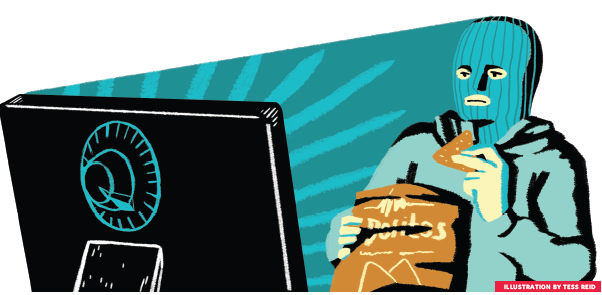
The entertainment industry is quick to tell us that online piracy is destroying music, TV, and film. But a look at the facts may lessen your guilt about downloading that low-res bootleg of August: Osage County.
A report released by NetNames, a company that works to protect brand names online, claims in 2012, online piracy accounted for 23.8 per cent of all bandwidth in North America, Europe, and Asia. The Recording Industry Association of America reports from the time Napster appeared in 1999 to 2009, music sales in the U.S. drastically dropped by 47 per cent.
Meanwhile, films were among the most pirated items, accounting for 35.2 per cent of illegal downloads in 2011. And while it appears that piracy has been detrimental to the entertainment business, some argue that it hasn’t at all.
Paul Aitken, a communication studies professor at York, argues the music industry, despite a drop in sales, began to exploit live music, “value-added” content such as VIP packages, restricted access material, and merchandise.
The industry discovered “those consumers who ‘pirated’ music were the same ones who bought music, went to concerts, bought T-shirts, etc.” By doing this, the music industry began to account for the sales lost to piracy and has in a sense “bounced back,” but with a bonus.
Interestingly, a report by the London School of Economics and Political Science noted that for the film industry in 2012, global box office sales were at a record-high $35 billion, an increase of six per cent over 2011. “In my view, none of it is stealing at all,” Aitken expands on the complexity of online piracy. All cultural production—film, music, and visual art—has influences, which are created through human social experience, he says.
“To suggest that this ‘product’ ought to be the private property of an individual or corporation who may then, due to arbitrary laws, profit from this material fundamentally misunderstands the process involved in creative activity and in the active social nature of the consumption of the creative work,” he says.
In a sense, if anyone is stealing, says Aitken, it is those who believe to own cultural content, which is the product of what he calls “common human experience.” Aitken also believes online piracy is actually forcing media corporations to be more creative in order to reach consumers.
“Many artists and authors have found innovative ways to utilize the free flow of information as a means to work independently of traditional media-industry firms,” he says.
“They publish or release music independently, develop their own followings through the use of social media, etcetera.” Content creators are developing new ways to reach audiences in the digital age. For instance, this winter, there will be a Sailor Moon series, which will stream worldwide.
Creativity in the entertainment industry, in a sense, is driven by the desire to reach the widest audience possible. Piracy has made “audience” a bigger and more democratic concept. So if online piracy encourages artists to be more creative, doesn’t it potentially help the industry rather than harm it?
It seems like piracy is here to stay, and no threats of $25,000 fines will stop it. So instead of rushing to delete all six seasons of Lost in fear of the next SOPA or PIPA-like law being passed, sit back and enjoy Sawyer’s abs in 6 pixels. You are still supporting the art in some way or another.
Ashley Glovasky
Deputy Copy Editor
Does online piracy make better art?



